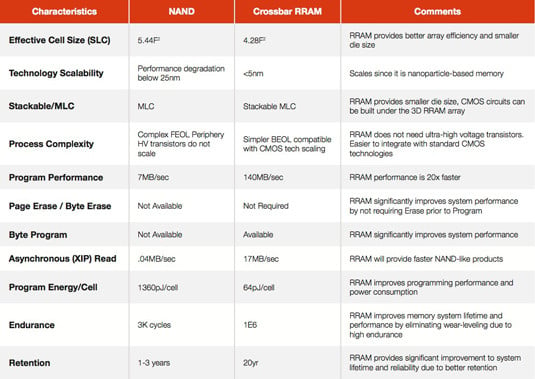
Crossbar claims significant advantages over NAND flash (click to enlarge)
Posted on 08/06/2013 12:01:28 PM PDT by Ernest_at_the_Beach
That's terabyte, not terabit.
"With our working Crossbar array, we have achieved all the major technical milestones that prove our RRAM technology is easy to manufacture and ready for commercialization," said Crossbar CEO George Minassian when announcing his company's new NAND flash competitor. "It's a watershed moment for the non-volatile memory industry."
Whether Minassian's exuberance is justified remains to be seen, but Crossbar RRAM tech certainly looks good on paper. The company claims that due to the tech's "simple" three-layer structure, it can be stacked in multiple layers resulting in multiple terabytes of storage space in a single chip "the size of a postage stamp."
Performance claims are also worth a gander. Compared with top-notch NAND flash memory, Crossbar claims that its tech will provide 20x faster writes at 20x lower power and with "10x the endurance," all in a die size that's half that of comparable NAND.
In addition, Crossbar claims that its tech – unlike NAND, which is hitting the process-shrink wall – will easily scale down to the sub–5 nanometer node, can hold data for 20 years, and has ridiculously faster asynchronous (execute in place) read speeds than NAND. How ridiculous? They claim 425x XIP improvements.
Of course, all this claimed goodness would simply provide pie-in-the-sky specs if the Crossbar RRAM parts were too expensive to manufacture at any reasonable price point. Minassian and his team, however, say they've got that covered, pointing to a working Crossbar memory array that they've baked at a commercial fab – although they did not say at what process node this demo array was manufactured.

CMOS logic below, Crossbar RRAM sitting on top
By using standard CMOS process technology, they say it would be possible to "easily stack non-volatile memory on top of microcontroller and other logic on FPGAs and highly integrated SoCs at advanced nodes." And yes, they do plan to license their tech to SoC designers.
Crossbar was founded in 2010, is based in Santa Clara, California, and has received $25m in funding, according to VentureBeat, from early investors Artiman, Kleiner Perkins Caufield & Byers, and Northern Light Venture Capital.
For more details on Crossbar's RRAM technology, check out their half-marketing, half-technology whitepaper (PDF). ®
fyi

This ought to give Moore’s Law a real shot in the arm.
I want my cheap 10TB thumb drives by Christmas, thank you :-)
If this works...we got a major revolution.
Looks like lower prices and MUCH higher capacity SSD drives if this technology is legit.
With essentially unlimited storage, write once is fine.
Some people with money believe in it....25 million dollars for the startup.
Specs sound awesome. I hope to see this tech make it to market.
Thanks for some great tech posts today btw!
Holy bleepety !!!
I want a 32 TB disk drive....
Heck with the memory capacity on one these things you start approaching the neded memory to back up a facimile copy of a person’s conciousness, the only limit is the BCI...
.
“If this works...we got a major revolution.”
I agree 100% ... this would be outstanding for FPGAs ... no more external config proms + loads of storage for other fun features :-).
It’s *almost* the perfect memory (seems like read times were slower than DRAM even accounting for DRAM overhead, but who cares!!!! :-)
I may have missed this in the article, but do writes destroy the cell over time like flash?
This is big, and somewhat disruptive actually. Of course, that all depends on if the hype is for real, but this looks awesome.
Awesome hope it makes it to market soon, I want to rip blu rays!
Blu Rays, nah. More porn!!! Blu Ray Porn, yeah!! Since it is not harmful or hurting anybody.:)
Also, this is nothing compared to my 512 exabyte write-only memory. My solution is faster, cheaper, lower power and works forever.
The NSA is gonna LOVE these things...
lol
I just finished looking thru the PDF
Lot's of good Info.
Not sure what the patent is about but I thought I saw the word nanotubes.....
Disclaimer: Opinions posted on Free Republic are those of the individual posters and do not necessarily represent the opinion of Free Republic or its management. All materials posted herein are protected by copyright law and the exemption for fair use of copyrighted works.